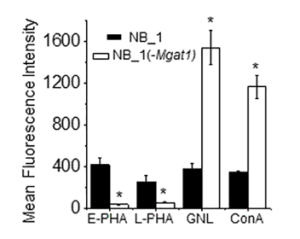A group from Department of Biochemistry and Molecular Biology, East Carolina University, Greenville, North Carolina, USA, etc. has reported that changes in N-glycosylation on neuroblastoma affect on cell proliferation and invasion.
https://journals.plos.org/plosone/article?id=10.1371/journal.pone.0259743
Two types of neuroblastoma cells were used. One is an engineered N-glycosylation mutant cell line with Mgat1 knockdown, NB_1(-Mgat1), expressed solely oligomannose N-glycans, and the other was its parental cell line, NB_1 expressed significant levels of higher order N-glycans, complex and hybrid N-glycans as shown below (GNL and ConA have higher affinity to oligomannose type N-glycans, and E-PHA and L-PHA have higher affinity to complex type N-glycans).
Cell growth was faster in NB_1 cells with complex type N-glycans than in NB_1(-Mgat1) cells without complex type N-glycans. Quantitatively speaking, there was about a 54% decrease in cell proliferation between NB_1(-Mgat1) cells and NB_1 cells.
NB_1(-Mgat1) cells had more and longer protrusions than NB_1 cells, indicating that the glycosylation mutant cells solely expressing oligomannose type N-glycans were more invasive than those expressing complex types of N-glycans. To quantify cell invasiveness, the ratio of measured invasive area to the measured sphere area was measured. The cell invasiveness of the NB_1(-Mgat1) cell line was 2.3-fold greater than the NB_1 cell line.

